八下Unit 6 Enjoying Cycling Topic 3 Bicycle riding is good exercise.复习课件24张
文档属性
| 名称 | 八下Unit 6 Enjoying Cycling Topic 3 Bicycle riding is good exercise.复习课件24张 | 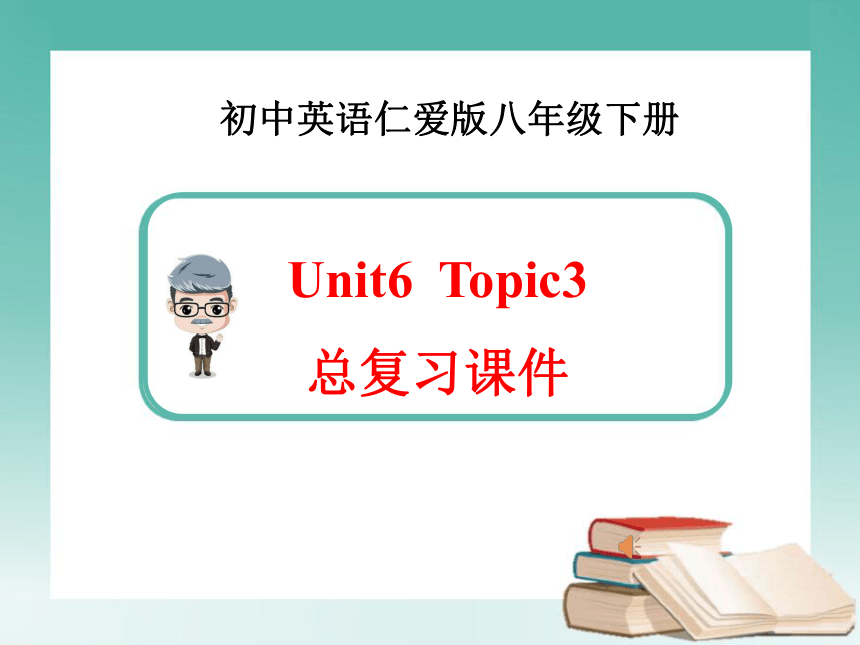 | |
| 格式 | zip | ||
| 文件大小 | 1.8MB | ||
| 资源类型 | 教案 | ||
| 版本资源 | 仁爱科普版 | ||
| 科目 | 英语 | ||
| 更新时间 | 2020-06-04 09:26:25 | ||
图片预览



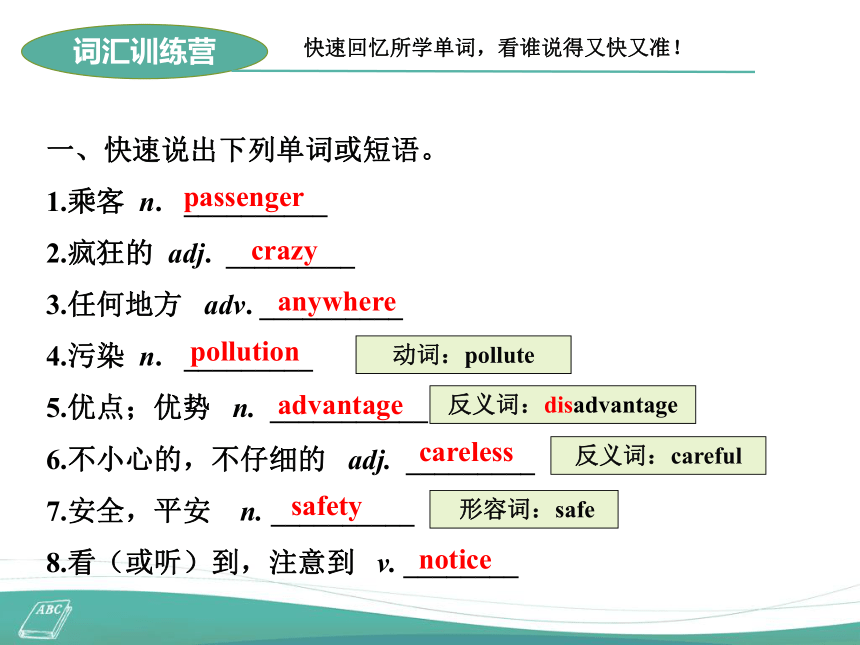
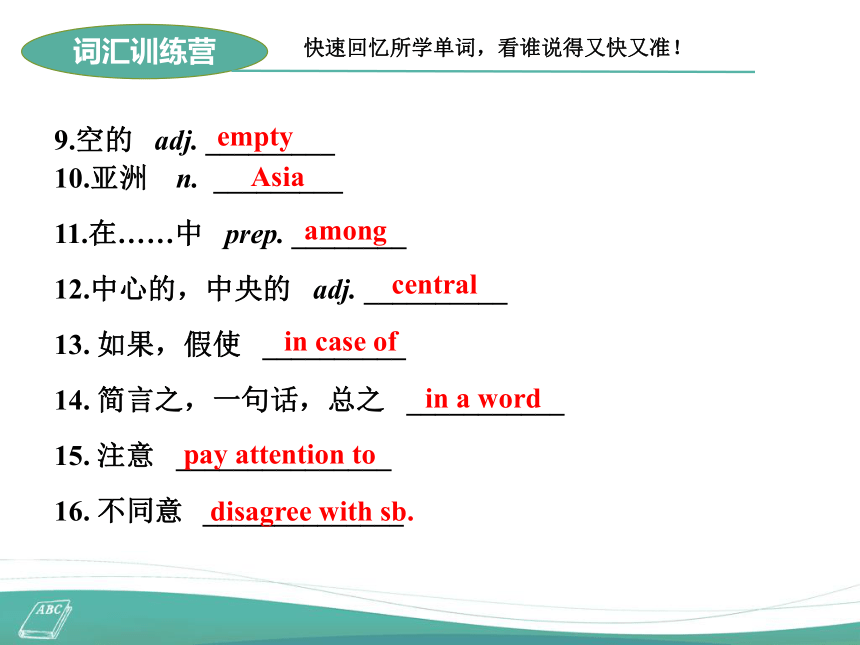
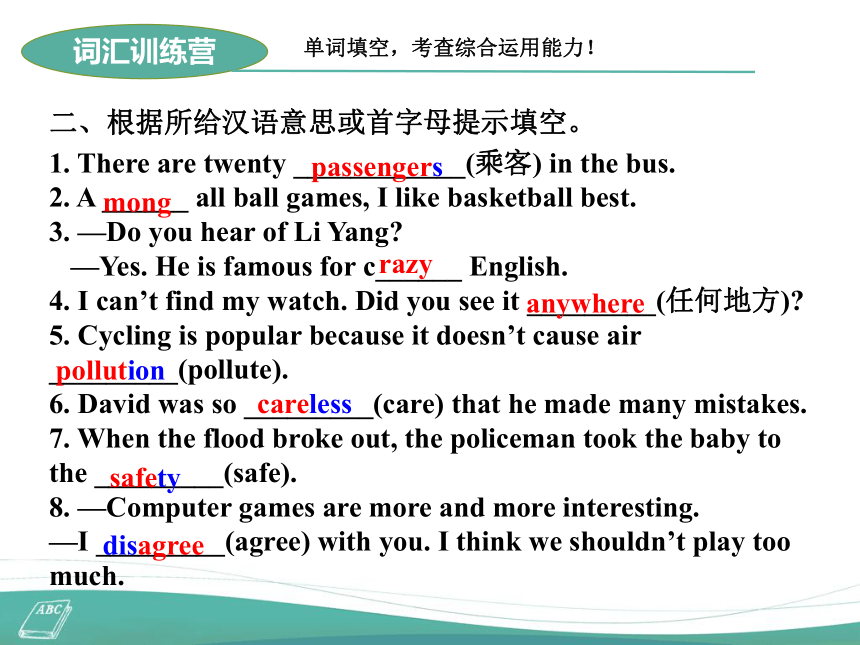
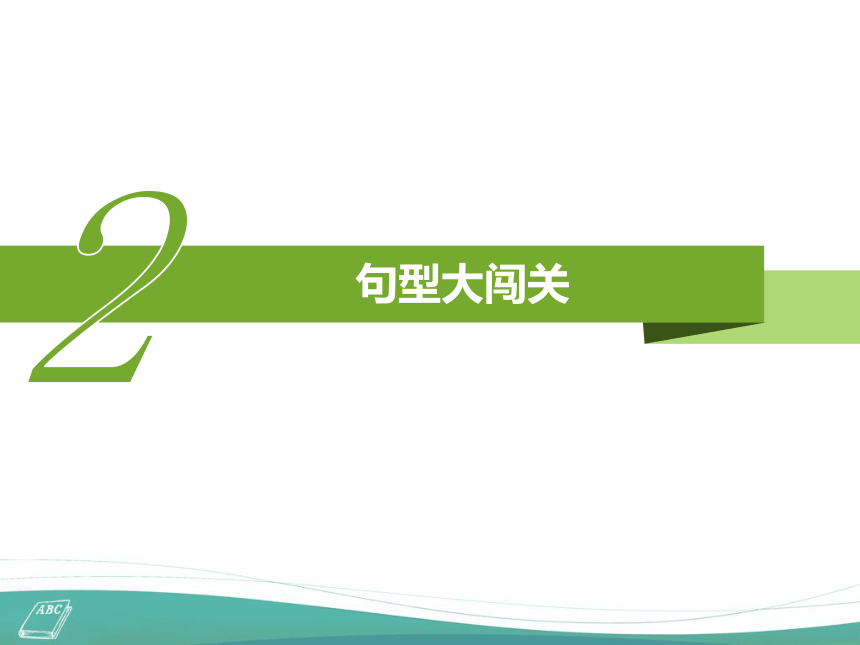
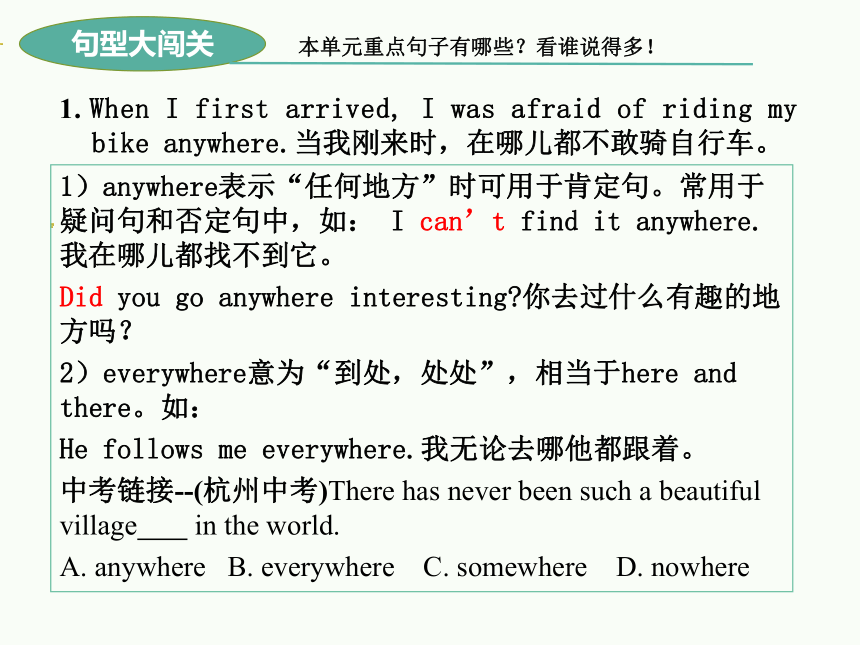

文档简介
(共24张PPT)
初中英语仁爱版八年级下册
Unit6
Topic3
总复习课件
词汇训练营
1
句型大闯关
2
语法加油站
3
内容大纲
词汇训练营
一、快速说出下列单词或短语。
1.乘客
n.
__________
2.疯狂的
adj.
_________
3.任何地方
adv.
__________
4.污染
n.
_________
5.优点;优势
n.
___________
6.不小心的,不仔细的
adj.
_________
7.安全,平安
n.
__________
8.看(或听)到,注意到
v.
________
passenger
crazy
anywhere
pollution
advantage
careless
快速回忆所学单词,看谁说得又快又准!
safety
notice
反义词:careful
形容词:safe
动词:pollute
反义词:disadvantage
9.空的
adj.
_________
10.亚洲
n.
_________
11.在……中
prep.
________
12.中心的,中央的
adj.
__________
如果,假使
__________
简言之,一句话,总之
___________
注意
_______________
不同意
______________
empty
Asia
among
central
快速回忆所学单词,看谁说得又快又准!
in
case
of
in
a
word
pay
attention
to
disagree
with
sb.
单词填空,考查综合运用能力!
1.
There
are
twenty
____________(乘客)
in
the
bus.
2.
A
______
all
ball
games,
I
like
basketball
best.
3.
—Do
you
hear
of
Li
Yang?
—Yes.
He
is
famous
for
c______
English.
4.
I
can’t
find
my
watch.
Did
you
see
it
_________(任何地方)?
5.
Cycling
is
popular
because
it
doesn’t
cause
air
_________(pollute).
6.
David
was
so
_________(care)
that
he
made
many
mistakes.
7.
When
the
flood
broke
out,
the
policeman
took
the
baby
to
the
_________(safe).
8.
—Computer
games
are
more
and
more
interesting.
—I
_________(agree)
with
you.
I
think
we
shouldn’t
play
too
much.
二、根据所给汉语意思或首字母提示填空。
passengers
mong
razy
anywhere
pollution
careless
safety
disagree
句型大闯关
本单元重点句子有哪些?看谁说得多!
1.
When
I
first
arrived,
I
was
afraid
of
riding
my
bike
anywhere.当我刚来时,在哪儿都不敢骑自行车。
1)anywhere表示“任何地方”时可用于肯定句。常用于疑问句和否定句中,如:
I
can’t
find
it
anywhere.我在哪儿都找不到它。
Did
you
go
anywhere
interesting?你去过什么有趣的地方吗?
2)everywhere意为“到处,处处”,相当于here
and
there。如:
He
follows
me
everywhere.我无论去哪他都跟着。
中考链接--(杭州中考)There
has
never
been
such
a
beautiful
village
in
the
world.
A.
anywhere
B.
everywhere
C.
somewhere
D.
nowhere
本单元重点句子有哪些?看谁说得多!
2.
Cycling
can
help
us
save
energy
and
it
doesn’t
cause
air
pollution.
骑自行车能帮助我们节约能源,并且不会造成空气污染。
1)
save
energy意为“节约能源”,save
time节约时间;save
money省钱;save
one’s
life意为“救某人的命”。
2)
air
pollution意为“空气污染”。water
pollution
水污染;noise
pollution
噪音污染。【拓展】pollute
v.
污染
3)
cause
及物动词,“导致,造成”。
本单元重点句子有哪些?看谁说得多!
3.
I
agree.
It’s
easy
to
park
bikes,
too.
我同意。而且停放自行车也很方便。
agree
with
sb.
“同意某人”,
disagree
with
sb.
“不同意某人”
中考链接--(漳州中考)一I
think
collecting
stamps
is
great
fun.
—__.
We
can
also
learn
a
lot
from
it.
A.
I
agree
with
you.
B.
No,
I
don’t
think
so.
C.No,
I
don’t
like
it
4.
If
people
obey
the
traffic
rules,
there
will
be
fewer
accidents.
如果人们遵守交通规则,交通事故就会减少。
此句是if引导的条件状语从句,遵循“主将从现”原则。
obey
the
traffic
rules“遵守交通规则”;fewer+可复“更少的”,less+不可
Can
you
finish
the
work
with
people
and
money?(更少的)
本单元重点句子有哪些?看谁说得多!
5.
If
we
break
the
traffic
rules,
we
may
get
a
fine
and
even
be
in
danger.如果我们违反交通规则,我们可能会被处以罚金,甚至会处于危险之中。
1)
break
the
traffic
rules
意为“违反交通规则”。
2)
get
a
fine意为“被处以罚金”,fine作名词“罚金”。fine也可作动词“处以罚金”。如:The
policeman
fined
him
50
yuan
for
speeding
3)
in
danger
“处于危险中”。out
of
danger“脱离危险”
6.
So
bicycle
riders
must
pay
attention
to
the
traffic
around
them
and
know
traffic
signals.因此骑车者必须注意周围车辆并了解交通信号的含义。
pay
attention
to
doing...“对……住意,对……当心”。类似:get/be
used
to
doing...,look
forward
to
doing....
本单元重点句子有哪些?看谁说得多!
7.
In
case
of
an
accident,
bicycle
riders
should
know
how
to
give
first
aid.万一发生事故,骑车者应该懂得如何进行急求。
1)
in
case
of“如果,假使”。2)
give
first
aid“急救”。
3)疑问词+to
do,I
don't
know
what
to
do/how
to
do
it。
8.
In
a
word,
the
best
way
to
be
safe
is
to
be
careful.
总之,保证安全的最好方法就是小心谨慎。
1)
in
a
word“总之,一句话”。
2)
to
be
safe意为“保证安全”,是动词不定式作后置定语修饰名词way;to
be
careful意为“小心谨慎”,是动词不定式作is的表语。
本单元重点句子有哪些?看谁说得多!
9.Bicycle
riding
can
make
the
riders’
hearts
and
lungs
strong.自行车运动能使骑车者的心肺更强健。
1)
bicycle
riding在此是动名词短语作主语,动名词作主语时,谓语动词用单数。如:Doing
eye
exercises
is
good
for
your
eyes.
做眼保健操对你的眼睛有好处。
2)
make
sb.
/sth.
+
adj意为“使某人/某物保持...状态”如:Let’s
work
hard
and
make
our
country
beautiful
and
strong.
让我们努力工作,使我们的国家变得美丽、富强。
3)make
sb.
/sth.
+
(not)do
sth
如:
The
teacher
often
makes
him
not
talk
in
class.
本单元重点句子有哪些?看谁说得多!
10.Drivers
do
not
always
notice
bicycles.司机们总是不太注意自行车。
notice
sb.
do
sth.意为“看见某人做了某事”。如:
I
noticed
them
run
every
morning.我看到他们每天早上跑。
2)
notice
sb.
doing
sth.意为“看到某人正在做某事”。如:
I
noticed
the
boy
reading
in
the
classroom.我注意到这个男生
正在教室里读书。
3)
notice
+
that
从句。如:
I
noticed
that
they
are
flying
kites.我看到他们正在放风筝。
4)
notice还可作名词,意为“布告,通知,注意”。如:
The
notice
says
“No
Smoking!”公告牌上写着“禁止吸烟”
类似:see/watch/hear
sb.do/doing
sth.
5)I
often
see
them
play
basketball.
6)When
I
passed
by,I
saw
them
playing
basketball.
本单元重点句子有哪些?看谁说得多!
11.
Today
the
race
covers
around
2
000
miles.
There
are
21
timed
stages
over
three
weeks.
如今,自行车赛的路程长达2000英里。有21个计时赛段,历时3周多。
cover此处是动词,“包括,包含”;cover
还有“覆盖,遮盖”之意。其常见搭配为:cover
sth.
with
sth.;be
covered
with“被……覆盖着”,如
The
roads
were
covered
with
snow
yesterday.
2)
timed是此处作形容词,意为“计时的”,
学以致用,你掌握了吗?
一、完成句子。
1.
骑自行车将不会导致空气污染。
Cycling
won’t
_______
_______
__________.
2.
我们每个人都应该遵守交通规则。
Every
one
of
us
should
obey
the
__________
______.
3.
节省能源十分重要,所以离开房间时随手关灯。
It
is
very
important
to
______
________.
So
please
turn
off
the
lights
when
you
leave
the
room.
句型大闯关
cause
air
pollution
traffic
rules
save
energy
学以致用,你掌握了吗?
4.
医生们在尽力挽救那个病危的孩子。
The
doctors
are
trying
their
best
to
save
the
boy
____
______.
5.
——太热了,我们到村里的那条河游泳吧。
——我不同意,那太危险了。
—It’s
too
hot.
Let’s
go
swimming
in
the
river
in
our
village.
—I
______
______
you.
It’s
too
dangerous.
句型大闯关
in
danger
disagree
with
语法加油站
总结本单元的语法知识,你掌握了吗
引导条件状语从句最常用的连词是if,表示在某条件下,某事很可能发生。
如:1.
If
you
ask
him,
he
will
help
you.如果你请他帮忙,他会帮你的。
2.If
you
fail
in
the
exam,
you
will
make
him
disappointed.如果你考试不及格,你会让他失望的。
3.If
you
finish
your
homework,
you
can
go
home.如果你作业做完了就可以回家了。
if引导的条件状语从句
总结本单元的语法知识,你掌握了吗
用
法
例
句
①
主句为一般将来时态,if从句用一般现在时态(即主将从现)。
We
will
stay
at
home
if
it
rains
tomorrow.如果明天下雨,我将要呆在家。
②
主句中含有情态动词,if从句用一般现在时态。
If
you
finish
your
homework,
you
can
go
home
now.
如果你做完了作业,你现在可以回家了。
③
主句为祈使句,if从句用一般现在时态。
Don’t
jump
into
the
river
if
you
feel
very
hot.?
如果你感到很热,不要跳入河里。
总结本单元的语法知识,你掌握了吗
扩展:1.当主句表示将来的意思(主句是将来时或含有情态动词或是祈使句时),unless、if引导的条件状语从句和when,before,after,not...until,as
soon
as引导时间状语从句要用一般现在时;
2.if还可用于宾语从句,意为“是否”相当于
whether,if引导宾语从句,时态需根据语境确定。如果主句用一般现在时,从句可以根据具体情况选用时态,如果主句用一般过去时,从句必须用过去式的某种形式。(主现从任,主过从过)
1)I
don't
know
if
it
will
rain
tomorrow.
我不知道明天是否会下雨。
2)Our
teacher
said
there
was
going
to
be
a
football
match
the
next
month.我们说下月将有场足球比赛。
学以致用,各个击破语法点
完成句子。
1.
If
it
______________(not
snow)tomorrow,
we
will
feel
unhappy.
2.
You
mustn’t
go
to
school
if
you
______(be)still
in
bed.
3.
Please
show
me
the
way
if
you
________(know)it.
单项选择。
(
)4.
I
don't
know
if
Tom
____back
tomorrow.If
he
back
tomorrow,I
will
call
you
up.
A.will
come,will
come
B.
comes,will
come
C.
will
come,
comes
句型大闯关
doesn’t
snow
are
know
C
学以致用,温故而知新
1.
Go
over
and
master
the
usages
of
adverbial
clauses
of
condition:
If
we
ride
at
night,
we
should
have
lights
on
the
bicycle
or
wear
light-colored
clothes.
If
we
break
the
traffic
rules,
we
will
get
a
fine
and
even
be
in
danger.
2.
Talk
about
traffic
rules
and
signs.
3.
Finish
the
exercises.
课后任务
初中英语仁爱版八年级下册
Unit6
Topic3
总复习课件
词汇训练营
1
句型大闯关
2
语法加油站
3
内容大纲
词汇训练营
一、快速说出下列单词或短语。
1.乘客
n.
__________
2.疯狂的
adj.
_________
3.任何地方
adv.
__________
4.污染
n.
_________
5.优点;优势
n.
___________
6.不小心的,不仔细的
adj.
_________
7.安全,平安
n.
__________
8.看(或听)到,注意到
v.
________
passenger
crazy
anywhere
pollution
advantage
careless
快速回忆所学单词,看谁说得又快又准!
safety
notice
反义词:careful
形容词:safe
动词:pollute
反义词:disadvantage
9.空的
adj.
_________
10.亚洲
n.
_________
11.在……中
prep.
________
12.中心的,中央的
adj.
__________
如果,假使
__________
简言之,一句话,总之
___________
注意
_______________
不同意
______________
empty
Asia
among
central
快速回忆所学单词,看谁说得又快又准!
in
case
of
in
a
word
pay
attention
to
disagree
with
sb.
单词填空,考查综合运用能力!
1.
There
are
twenty
____________(乘客)
in
the
bus.
2.
A
______
all
ball
games,
I
like
basketball
best.
3.
—Do
you
hear
of
Li
Yang?
—Yes.
He
is
famous
for
c______
English.
4.
I
can’t
find
my
watch.
Did
you
see
it
_________(任何地方)?
5.
Cycling
is
popular
because
it
doesn’t
cause
air
_________(pollute).
6.
David
was
so
_________(care)
that
he
made
many
mistakes.
7.
When
the
flood
broke
out,
the
policeman
took
the
baby
to
the
_________(safe).
8.
—Computer
games
are
more
and
more
interesting.
—I
_________(agree)
with
you.
I
think
we
shouldn’t
play
too
much.
二、根据所给汉语意思或首字母提示填空。
passengers
mong
razy
anywhere
pollution
careless
safety
disagree
句型大闯关
本单元重点句子有哪些?看谁说得多!
1.
When
I
first
arrived,
I
was
afraid
of
riding
my
bike
anywhere.当我刚来时,在哪儿都不敢骑自行车。
1)anywhere表示“任何地方”时可用于肯定句。常用于疑问句和否定句中,如:
I
can’t
find
it
anywhere.我在哪儿都找不到它。
Did
you
go
anywhere
interesting?你去过什么有趣的地方吗?
2)everywhere意为“到处,处处”,相当于here
and
there。如:
He
follows
me
everywhere.我无论去哪他都跟着。
中考链接--(杭州中考)There
has
never
been
such
a
beautiful
village
in
the
world.
A.
anywhere
B.
everywhere
C.
somewhere
D.
nowhere
本单元重点句子有哪些?看谁说得多!
2.
Cycling
can
help
us
save
energy
and
it
doesn’t
cause
air
pollution.
骑自行车能帮助我们节约能源,并且不会造成空气污染。
1)
save
energy意为“节约能源”,save
time节约时间;save
money省钱;save
one’s
life意为“救某人的命”。
2)
air
pollution意为“空气污染”。water
pollution
水污染;noise
pollution
噪音污染。【拓展】pollute
v.
污染
3)
cause
及物动词,“导致,造成”。
本单元重点句子有哪些?看谁说得多!
3.
I
agree.
It’s
easy
to
park
bikes,
too.
我同意。而且停放自行车也很方便。
agree
with
sb.
“同意某人”,
disagree
with
sb.
“不同意某人”
中考链接--(漳州中考)一I
think
collecting
stamps
is
great
fun.
—__.
We
can
also
learn
a
lot
from
it.
A.
I
agree
with
you.
B.
No,
I
don’t
think
so.
C.No,
I
don’t
like
it
4.
If
people
obey
the
traffic
rules,
there
will
be
fewer
accidents.
如果人们遵守交通规则,交通事故就会减少。
此句是if引导的条件状语从句,遵循“主将从现”原则。
obey
the
traffic
rules“遵守交通规则”;fewer+可复“更少的”,less+不可
Can
you
finish
the
work
with
people
and
money?(更少的)
本单元重点句子有哪些?看谁说得多!
5.
If
we
break
the
traffic
rules,
we
may
get
a
fine
and
even
be
in
danger.如果我们违反交通规则,我们可能会被处以罚金,甚至会处于危险之中。
1)
break
the
traffic
rules
意为“违反交通规则”。
2)
get
a
fine意为“被处以罚金”,fine作名词“罚金”。fine也可作动词“处以罚金”。如:The
policeman
fined
him
50
yuan
for
speeding
3)
in
danger
“处于危险中”。out
of
danger“脱离危险”
6.
So
bicycle
riders
must
pay
attention
to
the
traffic
around
them
and
know
traffic
signals.因此骑车者必须注意周围车辆并了解交通信号的含义。
pay
attention
to
doing...“对……住意,对……当心”。类似:get/be
used
to
doing...,look
forward
to
doing....
本单元重点句子有哪些?看谁说得多!
7.
In
case
of
an
accident,
bicycle
riders
should
know
how
to
give
first
aid.万一发生事故,骑车者应该懂得如何进行急求。
1)
in
case
of“如果,假使”。2)
give
first
aid“急救”。
3)疑问词+to
do,I
don't
know
what
to
do/how
to
do
it。
8.
In
a
word,
the
best
way
to
be
safe
is
to
be
careful.
总之,保证安全的最好方法就是小心谨慎。
1)
in
a
word“总之,一句话”。
2)
to
be
safe意为“保证安全”,是动词不定式作后置定语修饰名词way;to
be
careful意为“小心谨慎”,是动词不定式作is的表语。
本单元重点句子有哪些?看谁说得多!
9.Bicycle
riding
can
make
the
riders’
hearts
and
lungs
strong.自行车运动能使骑车者的心肺更强健。
1)
bicycle
riding在此是动名词短语作主语,动名词作主语时,谓语动词用单数。如:Doing
eye
exercises
is
good
for
your
eyes.
做眼保健操对你的眼睛有好处。
2)
make
sb.
/sth.
+
adj意为“使某人/某物保持...状态”如:Let’s
work
hard
and
make
our
country
beautiful
and
strong.
让我们努力工作,使我们的国家变得美丽、富强。
3)make
sb.
/sth.
+
(not)do
sth
如:
The
teacher
often
makes
him
not
talk
in
class.
本单元重点句子有哪些?看谁说得多!
10.Drivers
do
not
always
notice
bicycles.司机们总是不太注意自行车。
notice
sb.
do
sth.意为“看见某人做了某事”。如:
I
noticed
them
run
every
morning.我看到他们每天早上跑。
2)
notice
sb.
doing
sth.意为“看到某人正在做某事”。如:
I
noticed
the
boy
reading
in
the
classroom.我注意到这个男生
正在教室里读书。
3)
notice
+
that
从句。如:
I
noticed
that
they
are
flying
kites.我看到他们正在放风筝。
4)
notice还可作名词,意为“布告,通知,注意”。如:
The
notice
says
“No
Smoking!”公告牌上写着“禁止吸烟”
类似:see/watch/hear
sb.do/doing
sth.
5)I
often
see
them
play
basketball.
6)When
I
passed
by,I
saw
them
playing
basketball.
本单元重点句子有哪些?看谁说得多!
11.
Today
the
race
covers
around
2
000
miles.
There
are
21
timed
stages
over
three
weeks.
如今,自行车赛的路程长达2000英里。有21个计时赛段,历时3周多。
cover此处是动词,“包括,包含”;cover
还有“覆盖,遮盖”之意。其常见搭配为:cover
sth.
with
sth.;be
covered
with“被……覆盖着”,如
The
roads
were
covered
with
snow
yesterday.
2)
timed是此处作形容词,意为“计时的”,
学以致用,你掌握了吗?
一、完成句子。
1.
骑自行车将不会导致空气污染。
Cycling
won’t
_______
_______
__________.
2.
我们每个人都应该遵守交通规则。
Every
one
of
us
should
obey
the
__________
______.
3.
节省能源十分重要,所以离开房间时随手关灯。
It
is
very
important
to
______
________.
So
please
turn
off
the
lights
when
you
leave
the
room.
句型大闯关
cause
air
pollution
traffic
rules
save
energy
学以致用,你掌握了吗?
4.
医生们在尽力挽救那个病危的孩子。
The
doctors
are
trying
their
best
to
save
the
boy
____
______.
5.
——太热了,我们到村里的那条河游泳吧。
——我不同意,那太危险了。
—It’s
too
hot.
Let’s
go
swimming
in
the
river
in
our
village.
—I
______
______
you.
It’s
too
dangerous.
句型大闯关
in
danger
disagree
with
语法加油站
总结本单元的语法知识,你掌握了吗
引导条件状语从句最常用的连词是if,表示在某条件下,某事很可能发生。
如:1.
If
you
ask
him,
he
will
help
you.如果你请他帮忙,他会帮你的。
2.If
you
fail
in
the
exam,
you
will
make
him
disappointed.如果你考试不及格,你会让他失望的。
3.If
you
finish
your
homework,
you
can
go
home.如果你作业做完了就可以回家了。
if引导的条件状语从句
总结本单元的语法知识,你掌握了吗
用
法
例
句
①
主句为一般将来时态,if从句用一般现在时态(即主将从现)。
We
will
stay
at
home
if
it
rains
tomorrow.如果明天下雨,我将要呆在家。
②
主句中含有情态动词,if从句用一般现在时态。
If
you
finish
your
homework,
you
can
go
home
now.
如果你做完了作业,你现在可以回家了。
③
主句为祈使句,if从句用一般现在时态。
Don’t
jump
into
the
river
if
you
feel
very
hot.?
如果你感到很热,不要跳入河里。
总结本单元的语法知识,你掌握了吗
扩展:1.当主句表示将来的意思(主句是将来时或含有情态动词或是祈使句时),unless、if引导的条件状语从句和when,before,after,not...until,as
soon
as引导时间状语从句要用一般现在时;
2.if还可用于宾语从句,意为“是否”相当于
whether,if引导宾语从句,时态需根据语境确定。如果主句用一般现在时,从句可以根据具体情况选用时态,如果主句用一般过去时,从句必须用过去式的某种形式。(主现从任,主过从过)
1)I
don't
know
if
it
will
rain
tomorrow.
我不知道明天是否会下雨。
2)Our
teacher
said
there
was
going
to
be
a
football
match
the
next
month.我们说下月将有场足球比赛。
学以致用,各个击破语法点
完成句子。
1.
If
it
______________(not
snow)tomorrow,
we
will
feel
unhappy.
2.
You
mustn’t
go
to
school
if
you
______(be)still
in
bed.
3.
Please
show
me
the
way
if
you
________(know)it.
单项选择。
(
)4.
I
don't
know
if
Tom
____back
tomorrow.If
he
back
tomorrow,I
will
call
you
up.
A.will
come,will
come
B.
comes,will
come
C.
will
come,
comes
句型大闯关
doesn’t
snow
are
know
C
学以致用,温故而知新
1.
Go
over
and
master
the
usages
of
adverbial
clauses
of
condition:
If
we
ride
at
night,
we
should
have
lights
on
the
bicycle
or
wear
light-colored
clothes.
If
we
break
the
traffic
rules,
we
will
get
a
fine
and
even
be
in
danger.
2.
Talk
about
traffic
rules
and
signs.
3.
Finish
the
exercises.
课后任务
同课章节目录
- Unit 5 Feeling excited
- Topic 1 You look excited
- Topic 2 I’m feeling better now.
- Topic 3 Many things can affect our feelings.
- Unit 6 Enjoying Cycling
- Topic 1 We're going on a three-day visit to Mount
- Topic 2 How about exploring Tian’anmen Square?
- Topic 3 Bicycle riding is good exercise.
- Unit 7 Food festival
- Topic 1 We’re preparing for a food festival.
- Topic 2 I’m not sure whether I can cook it well.
- Topic 3 I Cooked the Most Successfully
- Unit 8 Our Clothes
- Topic 1 We will have a class fashion show.
- Topic 2 We can design our own uniforms.
- Topic 3 He said the fashion show was wonderful.
